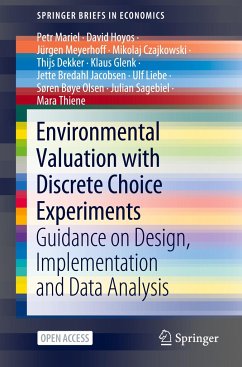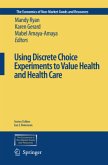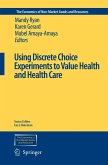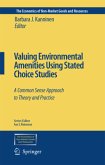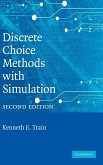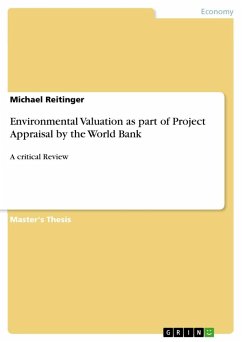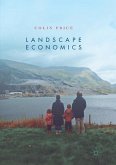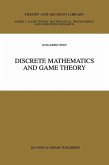Petr Mariel, David Hoyos, Jürgen Meyerhoff
Environmental Valuation with Discrete Choice Experiments
Guidance on Design, Implementation and Data Analysis
24,99 €
inkl. MwSt.
Versandfertig in 6-10 Tagen

12 °P sammeln
Petr Mariel, David Hoyos, Jürgen Meyerhoff
Environmental Valuation with Discrete Choice Experiments
Guidance on Design, Implementation and Data Analysis
- Broschiertes Buch
- Merkliste
- Auf die Merkliste
- Bewerten Bewerten
- Teilen
- Produkt teilen
- Produkterinnerung
- Produkterinnerung
This open access book offers up-to-date advice and practical guidance on how to undertake a discrete choice experiment as a tool for environmental valuation. It discusses crucial issues in designing, implementing and analysing choice experiments. Compiled by leading experts in the field, the book promotes discrete choice analysis in environmental valuation through a more solid scientific basis for research practice. Instead of providing strict guidelines, the book helps readers avoid common mistakes often found in applied work. It is based on the collective reflections of the scientific…mehr
Andere Kunden interessierten sich auch für
![Using Discrete Choice Experiments to Value Health and Health Care Using Discrete Choice Experiments to Value Health and Health Care]() Using Discrete Choice Experiments to Value Health and Health Care164,99 €
Using Discrete Choice Experiments to Value Health and Health Care164,99 €![Using Discrete Choice Experiments to Value Health and Health Care Using Discrete Choice Experiments to Value Health and Health Care]() Mandy Ryan (ed.)Using Discrete Choice Experiments to Value Health and Health Care164,99 €
Mandy Ryan (ed.)Using Discrete Choice Experiments to Value Health and Health Care164,99 €![Valuing Environmental Amenities Using Stated Choice Studies Valuing Environmental Amenities Using Stated Choice Studies]() Valuing Environmental Amenities Using Stated Choice Studies112,99 €
Valuing Environmental Amenities Using Stated Choice Studies112,99 €![Discrete Choice Methods with Simulation Discrete Choice Methods with Simulation]() Kenneth TrainDiscrete Choice Methods with Simulation164,99 €
Kenneth TrainDiscrete Choice Methods with Simulation164,99 €![Environmental Valuation as part of Project Appraisal by the World Bank Environmental Valuation as part of Project Appraisal by the World Bank]() Michael ReitingerEnvironmental Valuation as part of Project Appraisal by the World Bank27,95 €
Michael ReitingerEnvironmental Valuation as part of Project Appraisal by the World Bank27,95 €![Landscape Economics Landscape Economics]() Colin PriceLandscape Economics100,99 €
Colin PriceLandscape Economics100,99 €![Discrete Mathematics and Game Theory Discrete Mathematics and Game Theory]() Guillermo OwenDiscrete Mathematics and Game Theory149,99 €
Guillermo OwenDiscrete Mathematics and Game Theory149,99 €-
-
-
This open access book offers up-to-date advice and practical guidance on how to undertake a discrete choice experiment as a tool for environmental valuation. It discusses crucial issues in designing, implementing and analysing choice experiments. Compiled by leading experts in the field, the book promotes discrete choice analysis in environmental valuation through a more solid scientific basis for research practice. Instead of providing strict guidelines, the book helps readers avoid common mistakes often found in applied work. It is based on the collective reflections of the scientific network of researchers using discrete choice modelling in the field of environmental valuation (www.envecho.com).
Produktdetails
- Produktdetails
- SpringerBriefs in Economics
- Verlag: Springer / Springer International Publishing / Springer, Berlin / Technische Universität Darmstadt
- Artikelnr. des Verlages: 978-3-030-62668-6
- 1st ed. 2021
- Seitenzahl: 144
- Erscheinungstermin: 1. Dezember 2020
- Englisch
- Abmessung: 235mm x 155mm x 9mm
- Gewicht: 230g
- ISBN-13: 9783030626686
- ISBN-10: 3030626687
- Artikelnr.: 60198759
- Herstellerkennzeichnung Die Herstellerinformationen sind derzeit nicht verfügbar.
- SpringerBriefs in Economics
- Verlag: Springer / Springer International Publishing / Springer, Berlin / Technische Universität Darmstadt
- Artikelnr. des Verlages: 978-3-030-62668-6
- 1st ed. 2021
- Seitenzahl: 144
- Erscheinungstermin: 1. Dezember 2020
- Englisch
- Abmessung: 235mm x 155mm x 9mm
- Gewicht: 230g
- ISBN-13: 9783030626686
- ISBN-10: 3030626687
- Artikelnr.: 60198759
- Herstellerkennzeichnung Die Herstellerinformationen sind derzeit nicht verfügbar.
Petr Mariel is an Associate Professor at the Department of Econometrics and Statistics of the University of the Basque Country UPV/EHU (Bilbao, Spain). His research focus is centred on discrete choice modelling applied mainly to environmental valuation, but he has also worked in the field of health, public and urban economics. David Hoyos is an Associate Professor at the Department of Econometrics and Statistics of the University of the Basque Country UPV/EHU (Bilbao, Spain). His main area of research is focused on the economic valuation of natural resources. He is a member of the Committee of Experts of the UNESCO Chair on sustainable development and environmental education of the UPV/EHU. Jürgen Meyerhoff is Senior Research Fellow at the Institute of Landscape Architecture and Environmental Planning, Technische Universität Berlin (Germany) and at the Institute for Environmental, Resource and Regional Economics, Kiel University (Germany) . In his work he focuses on stated preference methods, especially choice experiments and their validity and reliability. Since 2017 he is Associate Editor at the Journal of Choice Modelling. Miköaj Czajkowski is a Full Professor at the Department of Economics at the University of Warsaw (Poland). His research interests include preferences and choice modelling, non-market valuation, microeconometrics and microeconomics. He mostly focuses on econometric methods used to model consumers' preferences and a range of field applications, including environmental economics. Thijs Dekker is a Lecturer in Transport Economics at the Institute for Transport Studies at the University of Leeds (UK). His research in the field of discrete choice modelling is on the cutting edge between econometrics, micro-economics and psychology. One of the strong features of his work is the use of both classical and Bayesian estimation techniques. Klaus Glenk is a Reader of Environmental and Resource Economics at the Department of Rural Economy, Environment and Society at Scotland's Rural College (Scotland). His research focuses on the micro analysis of consumer and household decisions. He has extensive experience in the methodological development and application of stated preference methods with a focus on environmental valuation. Jette Bredahl Jacobsen is Full Professor in Environmental and Resource Economics at the University of Copenhagen (Denmark). Her research includes non-market valuation and in particular the link to resource economics and management, focusing on topics like uncertainty, climate change, biodiversity and forests, often in interdisciplinary collaborations. Ulf Liebe is a Full Professor at the Department of Sociology and Director of the Warwick Q-Step Centre at the University of Warwick (UK). His research focus is on discrimination, environmental behaviour, multifactorial survey experiments, prosociality, survey methodology and sustainability. Søren Bøye Olsen is a Full Professor at the Department of Food and Resource Economics at the University of Copenhagen (Denmark). His research is focused on the valuation of non-market environmental goods with a particular emphasis on understanding consumer behaviour and preferences, often in the context of applied cost-benefit analysis and decision support. Julian Sagebiel is a postdoctoral researcher and lecturer at the Institute of Landscape Architecture and Environmental Planning, Technische Universität Berlin (Germany). He teaches and publishes in the domain of non-market valuation and discrete choice models with applications in agricultural and environmental economics. Mara Thiene is a Full Professor at the Department of Land, Environment, Agriculture and Forestry at the University of Padova (Italy). Her research is focused on environmental and resource economics, discrete-choice modelling, food choice, non-market valuation, agricultural and food economics, forest economics, energy economics and rural economics.
Theoretical Background.- Developing the Questionnaire.- Experimental Design.- Collecting the Data.- Econometric Modelling: Basics.- Econometric Modelling: Extensions.- Calculating Marginal and Non-Marginal Welfare Measures.- Validity and Reliability.- Software.
Theoretical Background.- Developing the Questionnaire.- Experimental Design.- Collecting the Data.- Econometric Modelling: Basics.- Econometric Modelling: Extensions.- Calculating Marginal and Non-Marginal Welfare Measures.- Validity and Reliability.- Software.
